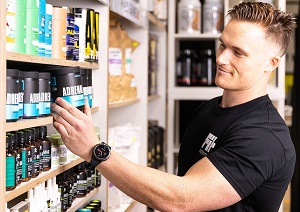Study Finds That Almost 90 Percent Of Sports Supplements Are Falsely Labelled With Many Containing Dangerous Compounds!
Thailand Medical News Team Aug 08, 2023 1 year, 8 months, 1 week, 3 days, 10 hours, 29 minutes ago
Sports Supplements: In the realm of health and fitness, the pursuit of peak performance has given rise to a multibillion-dollar industry of sports supplements. These products promise to enhance endurance, build muscle, and optimize athletic prowess. With the allure of improved physical capabilities, athletes and fitness enthusiasts have flocked to these
Sports Supplements, placing their trust in the labels that adorn the glossy packaging.

However, a recent study has peeled back the curtain on this industry, revealing a disconcerting truth: nearly 90% of sports supplements are falsely labeled, and some even harbor dangerous and banned substances.
The research, conducted by a collaborative team from prestigious institutions including Cambridge Health Alliance, Harvard Medical School, the University of Mississippi, and NSF International, set out to uncover the veracity of sports supplement claims. Their method employed advanced technology - liquid chromatography - quadrupole time-of-flight mass spectrometry - to scrutinize the contents of various sports supplements, providing a closer look at what is really within these highly marketed products.
The results were startling. Out of a total of 63 products analyzed, a staggering 89% were found to be inaccurately labeled. The discrepancies extended beyond mere inaccuracies - 12% of the products contained undisclosed banned substances, elevating the concern to a new level of gravity. It became evident that the world of sports supplements was not all it seemed, as the line between what was promised and what was truly delivered was obscured by fraudulent labeling practices.
The study's focus was directed toward five popular supplements: Rauwolfia vomitoria, methylliberine, turkesterone, halostachine, and octopamine. These substances, derived from plants, were often promoted for their purported stimulant or anabolic effects.
However, the reality proved far from the claims. Shockingly, a significant portion i.e.40% of the products analyzed contained no detectable trace of the labeled ingredient. For the remaining 34 products, the actual quantities varied dramatically, ranging from a mere 0.02% to a whopping 334% of the stated quantity. Astoundingly, only a mere 11% of the products contained an ingredient quantity within 10% of what was claimed on the label!
The deceptive practices didn't stop at erroneous labeling. The study uncovered the presence of prohibited and potentially dangerous substances in some of the supplements. These substances included 1,4-dimethylamylamine (DMAA), deterenol, octodrine (DMHA), oxilofrine, and omberacetam - all synthetic compounds that are often associated with adverse health effects.
For instance, DMAA, an analog of an amphetamine derivative, has been linked to heightened blood pressure and cardiovascular problems. Deterenol, a synthetic stimulant, has been banned in numerous countries and is known to cause
severe side effects including palpitations, chest pain, and cardiac arrest. Octodrine, once a nasal decongestant, has the potential to induce hypertension and dyspnea. Oxilofrine, developed to stimulate the heart, has been associated with vomiting, agitation, and even cardiac arrest.
The inclusion of these compounds in supposed "health" products is a stark reminder of the risks consumers unknowingly undertake when they place their faith in such supplements.
The discovery of omberacetam, a nootropic analog of piracetam, amidst this cocktail of synthetic stimulants is particularly puzzling. While piracetam is not approved in the United States, it is utilized elsewhere to treat cognitive impairments. However, adverse effects at pharmaceutical dosages include anxiety, insomnia, and agitation - a far cry from the intended benefits often promised by sports supplements.
The implications of these findings reverberate far beyond the realm of fitness and sports. Unlike rigorously regulated dose-specific medications, sports supplements fall under the category of food subcategory as per the US Food and Drug Administration (FDA). This regulatory loophole provides an avenue for unscrupulous manufacturers to exploit unsuspecting consumers, offering them products that are far from what they appear to be. The FDA's authority comes into play only after a tainted supplement reaches the market, often leading to product recalls and destruction. The difficulty in reigning in these practices is evident when the ingredients listed on a label do not match the actual contents of the product.
The onus of ensuring safety and accurate labeling of supplements lies on the manufacturers. Despite this responsibility, cases have emerged where individuals have faced legal consequences for selling products labeled as dietary supplements while containing unapproved drugs. This raises ethical questions about the human experimentation occurring without informed consent.
Perhaps the most disconcerting revelation from this study is the existence of products containing multiple unapproved and potentially hazardous drug compounds. Such an untested and risky concoction has never been subjected to scientific scrutiny, leaving consumers unknowingly exposed to the potential dangers lurking within the very products they believe will enhance their well-being.
The study's implications extend beyond consumer trust-they challenge the very fabric of an industry built on promises of peak performance and well-being. The unmasking of deceptive labeling practices and the presence of dangerous substances in sports supplements demand greater scrutiny, accountability, and regulation.
The study findings were published as a research letter in the peer reviewed journal: JAMA Network Open.
https://jamanetwork.com/journals/jamanetworkopen/fullarticle/2807343
For the latest on
Sports Supplements, keep on logging to Thailand Medical News.
